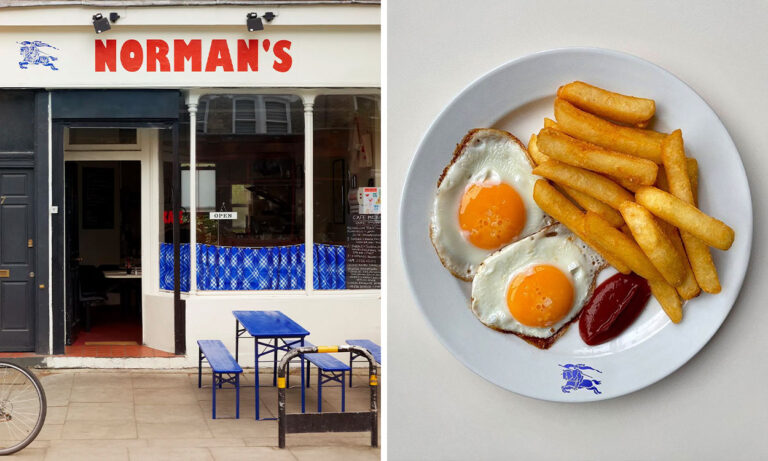Why Burberry’s London Fashion Week takeover of Norman’s Cafe is causing outrage online

London Fashion Week has always been a momentous occasion for fashion enthusiasts and industry leaders alike—with the UK capital often being celebrated for its upcoming and young designers. This year however, during LFW Spring/Summer 2024, Burberry, a renowned luxury brand with a rich history, finds itself at the centre of controversy.
For decades now, the brand—once favoured by a diverse clientele—has tried to distance itself from the ‘masses’ and did so by undergoing a significant shift in its revenue strategy. In its latest attempt, however, it seems that Burberry took things too far when it announced an LFW takeover of Norman’s Cafe, which netizens have since described as a mockery of the working class. Let me explain.
View this post on Instagram
As stated by Australian publication B&T, “In the noughties, the Burberry nova check pattern became inextricably linked with the ‘chav’ and football hooligans—two UK subcultures whose fortunes and prominence in society have ebbed and waned.”
It was around that time that UK tabloids began associating the nova check with the unemployed and disenfranchised portions of British society that they described as lazy, underserving and violent. For years, Burberry thrived on its broad customer base—up until it decided to alter its course and set its sights on an ultra-wealthy demographic.
View this post on Instagram
The brand’s recent LFW marketing campaign, which is meant to resonate with the affluent, has had the unintended consequence of alienating and frustrating a significant portion of its existing customer base. Those who once proudly wore Burberry products now feel as though their loyalty has been discarded in favour of a more exclusive audience.
For those of you who have never heard of Norman’s Cafe—pronounced ‘caff’ as opposed to ‘café’—the North London restaurant has been accused of “cosplaying British working class culture” for its overpriced dishes and its staff wearing trendy matching and branded uniforms to serve hipsters.
In some ways, the collaboration between the two brands makes sense. Both present themselves as quintessentially British. Norman’s has plastic chairs screwed to the floor and serves British classics for triple the price, while Burberry remains renowned for its classic and timeless designs that embody the essence of British style.
Oh, and both brands seem completely fine with hijacking the British working class’ cultural identity for their own benefit.
Another pretty evident indicator of this shift in marketing is the full-on Burberry takeover of one of London’s most iconic tube stops, Bond Street—or as it was called during LFW, Burberry Street. I won’t lie, I would not have appreciated this fashionable twist if I had been an out-of-town tourist trying to navigate the already confusing London underground.
@__sim0ne_ who did it best #burberrystreet #londonfashionweek
♬ original sound - habz.fx
@tfl ✨📍The next station is... Burberry Street @Burberry takes over Bond Street to celebrate #LondonFashionWeek Have you spotted this yet? #Burberry #BondStreet #TfL #TransportforLondon
♬ original sound - ɢʟᴍᴇᴍᴛ
Both the Norman’s takeover and the Burberry Street campaign have come under intense scrutiny, with critics arguing that they perpetuate stereotypes and trivialise the struggles of the working class. This backlash is not only directed at Burberry but also at the wider fashion industry, as it raises questions about the responsibility brands bear in their portrayal of social and economic disparities.
@thefairedit It's like someone in @Burberry's marketing team said "you guyssss, have you heard about something called the cost of living crisis? We should do something to join the conversation!!" It's giving the ick and Hunger Games all at the same time Over the past few years, Burberry has been working hard to make its brand exclusive again after their classic pattern went "too chevy". They've even BURNT millions of pounds worth of clothing to keep it from getting discounted, which means they rather burn their stock than having people with less money wearing it. Burberry has absolutely no transparency in their production and none of its supply chain is certified by labour standards that help ensure worker's health, safety, living wage and other rights 🤦🏻♀️ so yes, no thank you Burberry, you may leave now...
♬ original sound - STAR_LIGHTZ_XD💫
The controversy surrounding Burberry’s campaign serves as a stark reminder of the delicate balance that luxury brands must maintain between their heritage and their pursuit of new markets. The challenge lies in evolving and modernising without alienating the core customer base that has supported them through the years.





